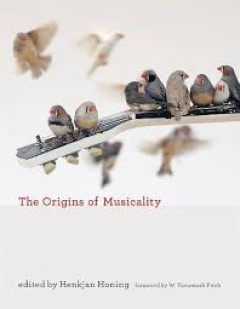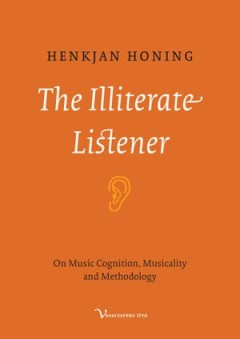Filter by

The origins of musicality
Principally revised versions of papers presented at the 2014 Lorentz Workshop "What Makes Us Musical Animals? Cognition, Biology and the Origins of Musicality," held in Leiden, the Netherlands, April 2014.Interdisciplinary perspectives on the capacity to perceive, appreciate, and make music. Research shows that all humans have a predisposition for music, just as they do for language. All of us …
- Edition
- -
- ISBN/ISSN
- 9780262344548
- Collation
- 1 online resource (xii, 351 pages) :illustrations
- Series Title
- -
- Call Number
- -

The Illiterate Listener: on Music Cognition, Musicality and methodology
We have known for some time that babies possess a keen perceptual sensitivity for the melodic, rhythmic and dynamic aspects of speech and music: aspects that linguists are inclined to categorize under the term ‘prosody’, but which are in fact the building blocks of music. Only much later in a child’s development does he make use of this ‘musical prosody’, for instance in delineating a…
- Edition
- -
- ISBN/ISSN
- 9780262327374
- Collation
- -
- Series Title
- -
- Call Number
- 780

The evolving animal orchestra :in search of what makes us musical
A music researcher's quest to discover other musical species. Even those of us who can't play a musical instrument or lack a sense of rhythm can perceive and enjoy music. Research shows that all humans possess the trait of musicality. We are a musical species--but are we the only musical species Is our musical predisposition unique, like our linguistic ability In The Evolving Animal Orchestra ,…
- Edition
- -
- ISBN/ISSN
- 9780262351157
- Collation
- 1 online resource (160 pages).
- Series Title
- -
- Call Number
- -

The Illiterate Listener: on music cognition, musicality and methodology
We have known for some time that babies possess a keen perceptual sensitivity for the melodic, rhythmic and dynamic aspects of speech and music: aspects that linguists are inclined to categorize under the term ‘prosody’, but which are in fact the building blocks of music. Only much later in a child’s development does he make use of this ‘musical prosody’, for instance in delineating a…
- Edition
- -
- ISBN/ISSN
- 9789048526987
- Collation
- -
- Series Title
- -
- Call Number
- 780
 Computer Science, Information & General Works
Computer Science, Information & General Works  Philosophy & Psychology
Philosophy & Psychology  Religion
Religion  Social Sciences
Social Sciences  Language
Language  Pure Science
Pure Science  Applied Sciences
Applied Sciences  Art & Recreation
Art & Recreation  Literature
Literature  History & Geography
History & Geography